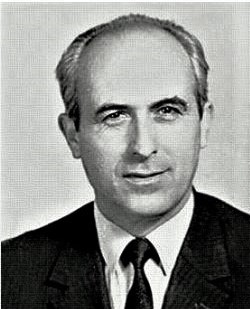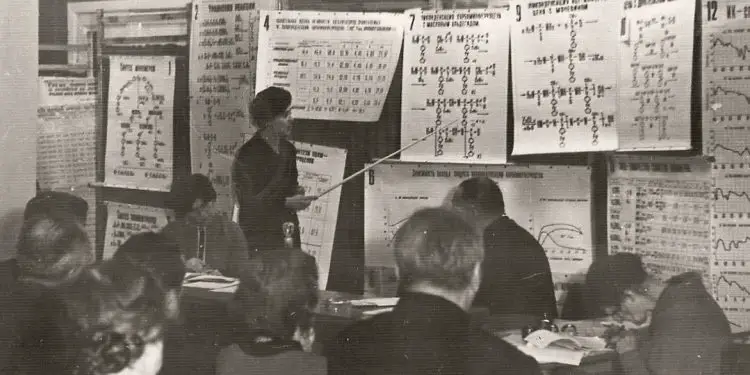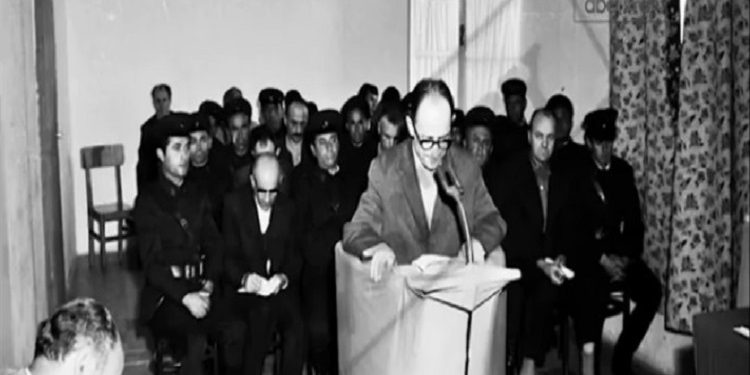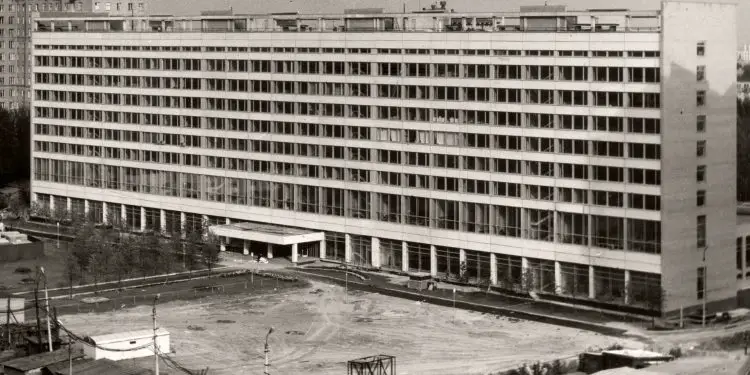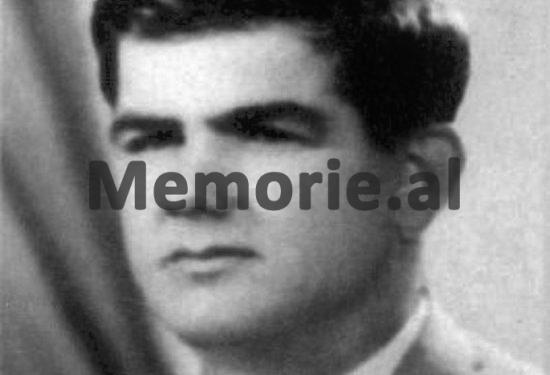By Petraq Xhaçka
The fourth part
Memorie.al / The purpose of this book are to join the efforts made to present the truths and horrors of the communist dictatorship in Albania. The main purpose of the book is not to show our people or anyone else, that we oilmen have been innocent, because this has become known from publications in our press, from foreign televisions, as well as from direct meetings with the International Forum and the Albanian Human Rights. The author’s desire, is that through this story, together with other stories, fight any manifestation in any form, even moderate, that he may have to create a communist society. I think that even through this bitter personal history, the cruel, treacherous and overbearing face of Enverism will appear, that for half a century, held the knife with the tip in the chest of the Albanian people, with a pine eye, intercepting the movements for salvation from the outside, or rebellion of the people themselves, ready to push the knife to the heart, at the first movement. The events are set in the economic fields where it has appeared most strongly, such as the oil and gas industry, where I was fortunate to pour my energies, for a lifetime, and become a participant and witness in those events. All the events that are written in this book of memories are true, not only without any exaggeration or embellishment of them, but perhaps, I don’t know how much I was able to present the terrifying force of the events that happened in that decadent system of socialism, where there was no human feeling.
The few people from our class who were working in Kuçova, together with some other technicians who worked in the offices, in the Processing Plant and in the power plant, slept in a shack built for the workers since the time of the Italians. In the room where I slept, there were two other people, but I remember the technician of the Kuçova radio station, a dear boy from Tirana, whom we called Pipo.
He often took radios from citizens and repaired them in our room, since there were no radio repair shops in those parts. But every now and then, he left parts of the radio out after he had completed the repair. I asked him why he left those parts out, and he, since he was unable to find their place again, answered me that they were superfluous. We were surprised that those parts were missing, but overall, they didn’t hinder the operation of the radio. Later this Pipoja attended a special course and became a very good technician for repairing televisions and radios.
On top of all the heavy workload, I was also assigned to give lessons at the Petroleum Institute in Kuçovo. The director there was the former student of the Polytechnic “7 November”, Gani Qemon, a very hardworking boy, very lively and close to the students. Except Qemoja wanted order. In addition to the lessons to entertain the students, boarders’ evenings were organized there almost every Saturday.
So when I was free, I went and spent a few pleasant hours there, among my fellow teachers and students, and felt a certain relaxation. Our class will never forget the chief surveyor of the Oil Company, Nasuf Dizdar. This was a boy from Shkodra, but a lively guy with a lot of humor. Whenever we bachelors would gather for dinner, he would make us laugh to tears with his good humor. Nasufi remained a dear person for us, throughout the later time, even when he moved to Tirana for work and created his family there.
He made us forget the fatigue of work and the isolation in which we lived, because work and opportunities did not allow us to go to our cities where we were born, raised and had our families. I remember that one night, in the canteen near the barracks where we slept, after eating bread, we asked him to tell us stories from his life. He imitated foreign languages very well, such as Russian, Italian, Hungarian, Greek, and others. After he did the impersonations, a Security employee approached us and asked Nasuf in the kitchen. Apparently, someone from the kitchen had called the Home Office or the police and they didn’t delay at all.
The policeman arrested Nasuf and took him to the offices of the Kuçova Internal Branch, under the charge of anti-Sovietism, as he had mocked the Russian language, which was spoken by the brotherly peoples of the Soviet Union. We had to wake up the General Director, Prokop Murra, in the middle of the night, while some friends went to the Department of Internal Affairs to clarify that there was no mockery or anti-Soviet action in the canteen. With difficulty after a few hours, near the morning, Nasuf was released and he returned to the apartment quite shocked.
It may seem strange that this hardness towards jokes, but this was the extent of the suppression of freedom in our country, already in those first years, which later became even more severe. After decades for such a comedy show, you could do many, many years in prison. From that night, Nasufi never imitated foreign languages, neither friends nor enemies, throughout his life. Later they could take you for an Americanophile, for anti-Chinese, as the policy of the Albanian communist leadership often changed suddenly.
In my nature, I have been very attached to sports, and all my life, although I lived far from Tirana, where I was born and spent my childhood, I remained a sports fan, or should we say a fan of the “17 November” Club teams. Later, my son Genci also maintained the same fandom, which had the pleasure of wearing the white and blue jersey of this Club on beach squares and vacation spots. Once, in the later years due to lack of transport, he sang, together with a large group of Tirana fans, he made the journey of about five hours, from Vlora to Fier, in the late hours, after the final match for the Cup of the Republic , which the footballers of Tirana won.
So in Kuçovo together with some other boys, mainly from Tirana or other cities, we organized sports activities in basketball and volleyball. There we managed to create two good teams, because in those times you could be active in two types of sports. We became members of the national championship or spartakiades and usually ranked fourth, after the well-known teams of “Partizan”, Tirana and “Dinamo”.
In these activities, I got to know the chemistry teacher of the Oil Technical University, Ali Hoxha, the best athlete in our team. Later, we made our friendship and friendship even closer with him and spread it through our families. We keep good memories for this family, as well as for several other families in Kuçova, where we spent a good part of our lives, with pure relations until the end.
In the company where I worked, around 1952, Ing. came as director. Ramiz Xhabija, who graduated from the Oil Institute “Gubkin”, in Moscow. Almost all the time, my work has connected me with him, because he held management positions in oil, the general director in Kuçova, then director and deputy minister in the department. He was full of will and loved his work. I dedicate my whole life to the oil industry, with those methods and forms of work that he had.
It should only be noted that, in the stages of drawing up the draft plans for the levels of oil extraction and the size of the new reserves that would be discovered, he was hasty, supporting unfeasible high figures. This often put him at odds with other specialists. Perhaps the fact that he was a member of the Party’s Central Committee influenced his actions.
In these years, Kiço Kasapi and Prokop Murra were also general directors. With the latter, I had the opportunity later to be connected at work for several years, after Murra became Minister of Mines and secretary of the Central Committee, for Industry. So he entered the high spheres of state leadership…!
Xhavit Hatibi, who worked for some time, remains unforgettable for me as a positive example of an honest leader, who listened to the voice of specialists, who was close to people and who tried to get away from conformism and unfair actions, as far as he was allowed as general director of oil, there around the sixties.
The negative appearance of many managers, whether they were small or large in the oil industry, has been the inflated and noisy discussion. Their communication with people, in most cases, was done with harsh tones, shouting and strong threats. Of course, at work, everyone has their flaws, especially under conditions of brutal dictatorship in the oil industry, where you constantly find wild politicization of mistakes and where the voice of specialists was not heard! It was the party leaders who decided on work plans and strategies.
And they had on the tip of their tongue the designation as hostile activity, if anyone, no matter how little, went against them, especially after the actions were approved or the orders came from above. The point is that in this terrain, not at all suitable for a normal work of specialists or managers, the man decided to fight as far as he could be allowed, to defend the technical requirements. Their conscience from the scientist dripped blood, when they had failed to be heard, and now the political cries invited them to shut up and become poor supporters of the wrong choices of the party leadership, which opposed mediocrity.
For most of this history of the oil industry in Albania, the leadership kept its ears open, for the voices coming from above. They above determined everything: how and when it should be done. It was nonsense with serious consequences for the country’s economy. But especially the Political Bureau, where the sick arrogance of the dictator Enver Hoxha made the law, especially after the seventies, overcame every norm and was the one that dictated everything. They started from the immediate goals, to overcome the difficulties we had from the vicious closing that they had done to the country. Then, when it came to finding the nail, where to bury the head of guilt, innocent people were accused and punished.
From the years 1953-’54, some senior oil specialists began to come, with studies completed abroad, such as in Russia, Romania, Poland, and so, gradually, the opportunity was created for us, the technicians, to be sent for studies in high in the country and abroad. The first senior specialists for the geology and mining branch from the University of Tirana came out in 1959. After a period, almost all of us secondary technicians, who had finished the first mining branch and had worked for years in oil, as an assessment of work, we were given the right to study for higher schools, but already in different branches, as assigned by the Ministry of Education, according to the needs of the country and not according to desire.
A good part of us was decorated with medals and work orders. Of the thirteen technicians, only four of us had the opportunity to study in oil schools and return to work in oil industry enterprises, namely; Protoko Murat, Niko Goxhobash, Tomi Kristos, me and the technician Hasan Hamza, who although he was one of the best students in the class, gave up on continuing his higher studies.
He was going to be stoned and he told me, as someone in those years, shot him and said that twenty and thirty years later, all five of us, all of us, distinguished for good work, would finish a days in prisons or killed themselves, as “criminals who wanted to overthrow the communist government by sabotaging the oil industry”!
Painful to the point of crying! But we have to admit that this might seem strange or paradoxical to anyone, but not to us! No way we! Let’s not forget that when, guys, without putting a razor on our cheeks, we started working at the Oil Refinery in Kuçovo, in 1951, we first encountered this paradox: we found a very tense situation there. There was talk of “hostile sabotage”!
Many of the oil company executives were accused of being enemies, since the plans had not been implemented. Imprisonment, deportation, dismissal, or reduction in responsibility was taken against them. Likewise, we learned there that before, foreign and Albanian engineers were sentenced to death by firing squad, such as the prominent Polish geologist, Stanislav Zuber, discoverer of the Baku oil field and prominent personality in the international arena of geology. This oil scientist was brutally tortured in the New Prison of Tirana and as the well-known writer Petro Marko tells in his novel, Professor Zuberi died from blows to the head, where the kicks of his investigators fell furiously.
Together with him, other specialists were sentenced, who had worked for many years with foreign companies in Albania, before its liberation. They were convicted of the charge; “saboteurs in the service of foreign states, and to the detriment of the popular power”! These were the words we found being said there, and we were not in a position to judge whether these accusations were true or not. It didn’t even occur to us that we should question such a thing! I can only say this and I must say it: we geological specialists continued to use Zuber’s maps.
During our work on geological studies, Stanislav Zuber’s maps, for the level of stratigraphic studies of those times, were scientific documents, with an achieved level. They showed that he was a geologist, with a fairly high training, with a wide range of rare knowledge in the fields of geology. So since the first years of the communist power, in the oil industry, the lives of many high specialists with outstanding values have been prematurely extinguished. The oil extracted in Albania since its beginnings, and especially during the years of the dictatorship, had a “blood” component in its chemical elements.
Even for many years it will continue to emerge from the Albanian underground, mixed like that. Gas and oil would be very, very expensive here, if you count the price of the “blood and tears” of those who worked and suffered for it, of their families and children. Unfortunately at first it was difficult to understand the truth of these capital punishments, and everything was thought that these events had ended there. The wolf of Albanian communism was still wearing lamb’s skin to lie to people. None of us thought that other hostile groups would be invented later.
We are witnesses to the falsity of those accusations and they were only aspects of the terror of dictator Hoxha’s communist repression, in the oil sector, to keep people working and living under the daily shadow of fear. Like the octopus when it has no food, it eats its own legs, and the communist dictatorship, after it finished punishing and persecuting foreign specialists, or those who had studied in Western countries, began to punish specialists and cadres who grew up and were educated in that regime.
Student period in Moscow
With the issuance of scholarships for abroad from the Ministry of Education, in June 1954, I terminated my employment in Kuçovo and returned to Tirana, near my family, to undergo medical examinations and to complete all the documents necessary.
We would travel to Odesa with the Russian passenger steamer “Peter the Great”, which would depart from Durrës. We were many Albanian students. Some were traveling for the first time, and some were returning from vacations they had spent with their families in Albania. It is understood that my emotions and joy were great, because not only did I have the opportunity to continue my studies as an engineer, but also because for the first time, I was going abroad, which was a rare event in our country.
Free exit outside the borders of the country was not allowed here and you could not find good clothes to wear. I bought a coat with drapery pieces, produced by the Textile Factory of Tirana. The hood was a cherry-red color and scratched the body, but I thought it necessary, for the cold climate of Russia. The trip of about five days was quite beautiful, because, in general, the blue surface of the waters was calm and except on one of the days, the sea did not catch us and we had no turbulence.
During the passage through the Dardanelles, we enjoyed with our own eyes the beautiful sight of the city of Istanbul with all those minarets and mosques known for their architecture reproduced so much in photographs and albums in Albania. We also stopped at the Bulgarian port of Varna, where we were allowed to go out into the surroundings of the port for a few hours. This trip left an impression on me because it was the first time I traveled by steamer. I loved going out on the forecourt to hear the pleasant sound of the steamer’s nose breaking the waves and enjoy the cool breeze caressing your face. Upon arriving in Odesa, we were immediately taken by train to Moscow, a trip that lasted nearly two days.
In the Soviet capital, we were met by the representatives of our embassy and the administration of Russian schools, which separated us from the universities where we were predestined to continue our studies. The views into the city were incredibly impressive. For the first time I was looking at a big city, with many lights, with mostly multi-story buildings, with beautiful architecture, with wide streets and with a sensitive traffic, especially compared to the country where we came from?
The dormitory of our oil institute named after the well-known academician “Gubkin”, was composed of several five-story buildings. They had been built for many years and were not noted for comfort. Four students lived in each room. They put me with Abedin Sanxhaktari, (as an Albanian forced by the rule set by the embassy), with a Bulgarian and a Russian. I already knew Abedin in Albania, because he did his high school in the mining branch of the “7 November” Polytechnic. All our five years of school in Moscow, we spent, not only in the same class of the geology course, but also in almost the same dormitory room.
This brought us very close, so much so that we brotherly helped each other, sharing everything together. We continued this sincere friendship later, while working in our country, in the oil industry. Two years later, we were moved from these dormitories and placed in a large, eight-story, newly built U-shaped building. Here the rooms were bigger, more comfortable and, depending on the occasion, we lived in them sometimes three, sometimes four students. Memorie.al




